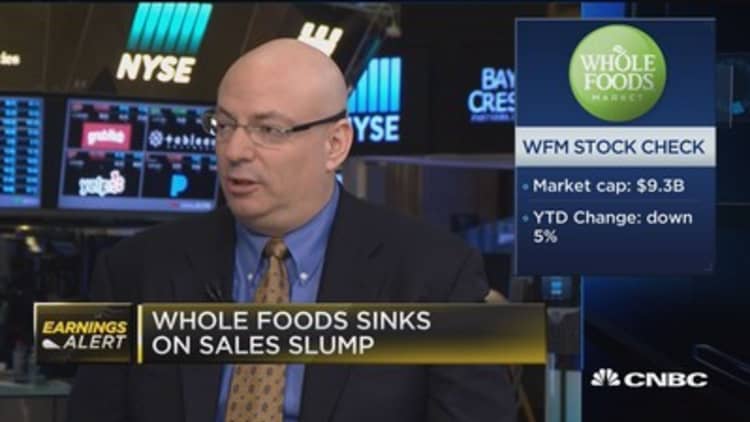
Shares of Whole Foods Market dropped nearly 4 percent in after hours trading Wednesday, after the high-end grocer reported revenues and comparable sales that fell short of Wall Street's expectations.
The company also lowered full-year sales and earnings guidance in wake of the weak results.
Whole Foods earned an adjusted 39 cents a share during the first quarter, in line with a consensus estimate from Thomson Reuters. But revenue came in at $4.92 billion, shy of the $4.98 billion expected.
The company earned 46 cents a share on $4.83 billion in sales in the prior-year period.
"In this increasingly competitive marketplace, we are committed to taking every step necessary to improve comps and deliver higher returns for our shareholders," said John Mackey, co-founder and chief executive officer of Whole Foods Market.
"To this end, we are refining our growth strategy, refocusing our efforts on best serving our core customers, and moving faster to fully implement category management. Evolving our purchasing operating model while developing data-rich, customer-centric category management capabilities is critical to our go-forward merchandising, pricing, marketing and affinity strategies."
Whole Foods meanwhile reported its sixth consecutive same-store sales decline. Comparable sales slid 2.4 percent during the quarter, a steeper decline than the 1.8 percent expected by FactSet.
The company also cut its outlook for the full year based on slower sales growth and additional costs. Whole Foods now expects sales growth of "1.5 percent or greater," compared with its prior forecast of a 2.5 percent to 4.5 percent increase.
It meanwhile expects comparable sales to decline 2.5 percent "or better," compared with its previous expectation of flat to down 2 percent. This metric was 3.2 percent lower on the year during the first few weeks of the second quarter.
For fiscal 2017, Whole Foods expects to earn $1.33 a share "or greater," compared with the $1.42 a share it previously forecast.
Whole Foods has been struggling to get shoppers into its stores as lower-price competitors offer organic foods at a discount. Indeed, while customers put more items in their baskets during the first quarter, fewer shoppers made transactions in its stores. Whole Foods has also been struggling to grow sales in a deflationary environment.

The company is taking steps to boost its performance, including the rollout of a more budget-friendly store fleet called 365 by Whole Foods Market. And at the end of 2016, the grocer did away with its co-CEO structure, shifting naming Mackey the sole leader. The company said that Walter Robb would remain on its board of directors.
Whole Foods' net income during the first quarter was $95 million. The company incurred a non-cash charge of $34 million, or 6 cents per diluted share, related to store and facility closures. It also incurred a charge of $13 million, or 3 cents per diluted share, associated with Robb's separation agreement.
The grocer expects to incur an additional charge in the second quarter of about $30 million, or 6 cents per diluted share, related to the previously mentioned closures. It also expects the year's cost savings to be more than offset by investments in marketing, value and technology.
"While food prices are starting to reflate, we expect much of the benefit to be offset by the company's need to invest in price to be more competitive," Joseph Feldman, senior research analyst at the Telsey Advisory Group, told investors ahead of the release.


